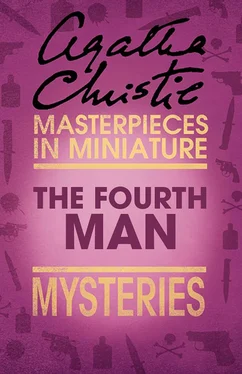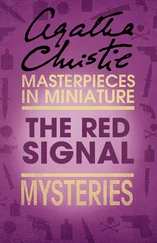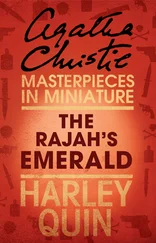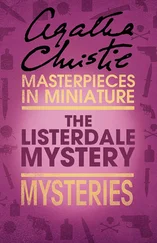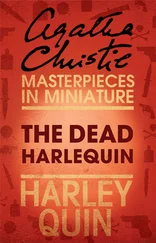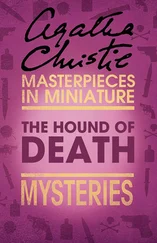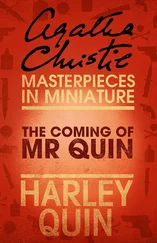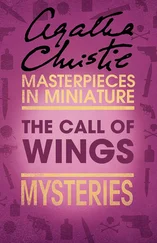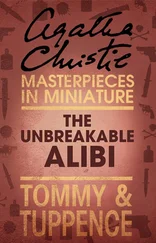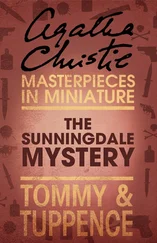Agatha Christie - The Fourth Man - An Agatha Christie Short Story
Здесь есть возможность читать онлайн «Agatha Christie - The Fourth Man - An Agatha Christie Short Story» — ознакомительный отрывок электронной книги совершенно бесплатно, а после прочтения отрывка купить полную версию. В некоторых случаях можно слушать аудио, скачать через торрент в формате fb2 и присутствует краткое содержание. Жанр: unrecognised, на английском языке. Описание произведения, (предисловие) а так же отзывы посетителей доступны на портале библиотеки ЛибКат.
- Название:The Fourth Man: An Agatha Christie Short Story
- Автор:
- Жанр:
- Год:неизвестен
- ISBN:нет данных
- Рейтинг книги:5 / 5. Голосов: 1
-
Избранное:Добавить в избранное
- Отзывы:
-
Ваша оценка:
- 100
- 1
- 2
- 3
- 4
- 5
The Fourth Man: An Agatha Christie Short Story: краткое содержание, описание и аннотация
Предлагаем к чтению аннотацию, описание, краткое содержание или предисловие (зависит от того, что написал сам автор книги «The Fourth Man: An Agatha Christie Short Story»). Если вы не нашли необходимую информацию о книге — напишите в комментариях, мы постараемся отыскать её.
The Fourth Man: An Agatha Christie Short Story — читать онлайн ознакомительный отрывок
Ниже представлен текст книги, разбитый по страницам. Система сохранения места последней прочитанной страницы, позволяет с удобством читать онлайн бесплатно книгу «The Fourth Man: An Agatha Christie Short Story», без необходимости каждый раз заново искать на чём Вы остановились. Поставьте закладку, и сможете в любой момент перейти на страницу, на которой закончили чтение.
Интервал:
Закладка:
The Fourth Man
A Short Story
by Agatha Christie
Copyright Copyright The Fourth Man Related Products About the Publisher
Published by HarperCollins Publishers Ltd 1 London Bridge Street London SE1 9GF www.harpercollins.co.uk
Copyright © 2008 Agatha Christie Ltd.
All rights reserved under International and Pan-American Copyright Conventions. By payment of the required fees, you have been granted the nonexclusive, nontransferable right to access and read the text of this e-book onscreen. No part of this text may be reproduced, transmitted, downloaded, decompiled, reverse engineered, or stored in or introduced into any information storage and retrieval system, in any form or by any means, whether electronic or mechanical, now known or hereinafter invented, without the express written permission of HarperCollins e-books.
HarperCollins Publishers has made every reasonable effort to ensure that any picture content and written content in this ebook has been included or removed in accordance with the contractual and technological constraints in operation at the time of publication.
Ebook Edition © MAY 2013 ISBN 9780007526536
Version: 2017-04-13
Contents
Cover
Title Page The Fourth Man A Short Story by Agatha Christie
Copyright
The Fourth Man
Related Products
About the Publisher
The Fourth Man The Fourth Man Related Products About the Publisher
‘The Fourth Man’ was first published in Pearson’s Magazine , December 1925.
Canon Parfitt panted a little. Running for trains was not much of a business for a man of his age. For one thing his figure was not what it was and with the loss of his slender silhouette went an increasing tendency to be short of breath. This tendency the Canon himself always referred to, with dignity, as ‘ My heart , you know!’
He sank into the corner of the first-class carriage with a sigh of relief. The warmth of the heated carriage was most agreeable to him. Outside the snow was falling. Lucky to get a corner seat on a long night journey. Miserable business if you didn’t. There ought to be a sleeper on this train.
The other three corners were already occupied, and noting this fact Canon Parfitt became aware that the man in the far corner was smiling at him in gentle recognition. He was a clean-shaven man with a quizzical face and hair just turning grey on the temples. His profession was so clearly the law that no one could have mistaken him for anything else for a moment. Sir George Durand was, indeed, a very famous lawyer.
‘Well, Parfitt,’ he remarked genially, ‘you had a run for it, didn’t you?’
‘Very bad for my heart, I’m afraid,’ said the Canon. ‘Quite a coincidence meeting you, Sir George. Are you going far north?’
‘Newcastle,’ said Sir George laconically. ‘By the way,’ he added, ‘do you know Dr Campbell Clark?’
The man sitting on the same side of the carriage as the Canon inclined his head pleasantly.
‘We met on the platform,’ continued the lawyer. ‘Another coincidence.’
Canon Parfitt looked at Dr Campbell Clark with a good deal of interest. It was a name of which he had often heard. Dr Clark was in the forefront as a physician and mental specialist, and his last book, The Problem of the Unconscious Mind , had been the most discussed book of the year.
Canon Parfitt saw a square jaw, very steady blue eyes and reddish hair untouched by grey, but thinning rapidly. And he received also the impression of a very forceful personality.
By a perfectly natural association of ideas the Canon looked across to the seat opposite him, half-expecting to receive a glance of recognition there also, but the fourth occupant of the carriage proved to be a total stranger – a foreigner, the Canon fancied. He was a slight dark man, rather insignificant in appearance. Huddled in a big overcoat, he appeared to be fast asleep.
‘Canon Parfitt of Bradchester?’ inquired Dr Campbell Clark in a pleasant voice.
The Canon looked flattered. Those ‘scientific sermons’ of his had really made a great hit – especially since the Press had taken them up. Well, that was what the Church needed – good modern up-to-date stuff.
‘I have read your book with great interest, Dr Campbell Clark,’ he said. ‘Though it’s a bit technical here and there for me to follow.’
Durand broke in.
‘Are you for talking or sleeping, Canon?’ he asked. ‘I’ll confess at once that I suffer from insomnia and that therefore I’m in favour of the former.’
‘Oh! certainly. By all means,’ said the Canon. ‘I seldom sleep on these night journeys, and the book I have with me is a very dull one.’
‘We are at any rate a representative gathering,’ remarked the doctor with a smile. ‘The Church, the Law, the Medical Profession.’
‘Not much we couldn’t give an opinion on between us, eh?’ laughed Durand. ‘The Church for the spiritual view, myself for the purely worldly and legal view, and you, doctor, with widest field of all, ranging from the purely pathological to the super-psychological! Between us three we should cover any ground pretty completely, I fancy.’
‘Not so completely as you imagine, I think,’ said Dr Clark. ‘There’s another point of view, you know, that you left out, and that’s rather an important one.’
‘Meaning?’ queried the lawyer.
‘The point of view of the Man in the Street.’
‘Is that so important? Isn’t the Man in the Street usually wrong?’
‘Oh! almost always. But he has the thing that all expert opinion must lack – the personal point of view. In the end, you know, you can’t get away from personal relationships. I’ve found that in my profession. For every patient who comes to me genuinely ill, at least five come who have nothing whatever the matter with them except an inability to live happily with the inmates of the same house. They call it everything – from housemaid’s knee to writer’s cramp, but it’s all the same thing, the raw surface produced by mind rubbing against mind.’
‘You have a lot of patients with “nerves”, I suppose,’ the Canon remarked disparagingly. His own nerves were excellent.
‘Ah! and what do you mean by that?’ The other swung round on him, quick as a flash. ‘Nerves! People use that word and laugh after it, just as you did. “Nothing the matter with so and so,” they say. “Just nerves.” But, good God, man, you’ve got the crux of everything there! You can get at a mere bodily ailment and heal it. But at this day we know very little more about the obscure causes of the hundred and one forms of nervous disease than we did in – well, the reign of Queen Elizabeth!’
‘Dear me,’ said Canon Parfitt, a little bewildered by this onslaught. ‘Is that so?’
‘Mind you, it’s a sign of grace,’ Dr Campbell Clark went on. ‘In the old days we considered man a simple animal, body and soul – with stress laid on the former.’
‘Body, soul and spirit,’ corrected the clergyman mildly.
‘Spirit?’ The doctor smiled oddly. ‘What do you parsons mean exactly by spirit? You’ve never been very clear about it, you know. All down the ages you’ve funked an exact definition.’
The Canon cleared his throat in preparation for speech, but to his chagrin he was given no opportunity. The doctor went on.
‘Are we even sure the word is spirit – might it not be spirits? ’
‘Spirits?’ Sir George Durand questioned, his eyebrows raised quizzically.
‘Yes.’ Campbell Clark’s gaze transferred itself to him. He leaned forward and tapped the other man lightly on the breast. ‘Are you so sure,’ he said gravely, ‘that there is only one occupant of this structure – for that is all it is, you know – this desirable residence to be let furnished – for seven, twenty-one, forty-one, seventy-one – whatever it may be! – years? And in the end the tenant moves his things out – little by little – and then goes out of the house altogether – and down comes the house, a mass of ruin and decay. You’re the master of the house – we’ll admit that, but aren’t you ever conscious of the presence of others – soft-footed servants, hardly noticed, except for the work they do – work that you’re not conscious of having done? Or friends – moods that take hold of you and make you, for the time being, a “different man” as the saying goes? You’re the king of the castle, right enough, but be very sure the “dirty rascal” is there too.’
Читать дальшеИнтервал:
Закладка:
Похожие книги на «The Fourth Man: An Agatha Christie Short Story»
Представляем Вашему вниманию похожие книги на «The Fourth Man: An Agatha Christie Short Story» списком для выбора. Мы отобрали схожую по названию и смыслу литературу в надежде предоставить читателям больше вариантов отыскать новые, интересные, ещё непрочитанные произведения.
Обсуждение, отзывы о книге «The Fourth Man: An Agatha Christie Short Story» и просто собственные мнения читателей. Оставьте ваши комментарии, напишите, что Вы думаете о произведении, его смысле или главных героях. Укажите что конкретно понравилось, а что нет, и почему Вы так считаете.
